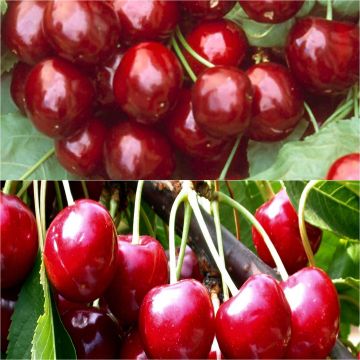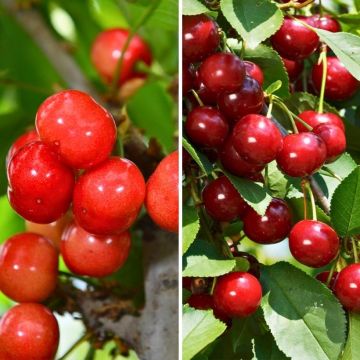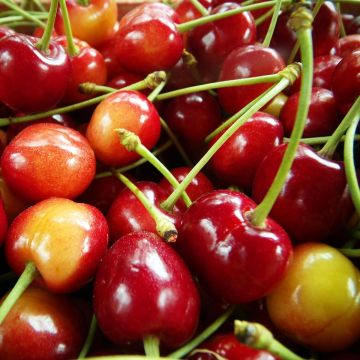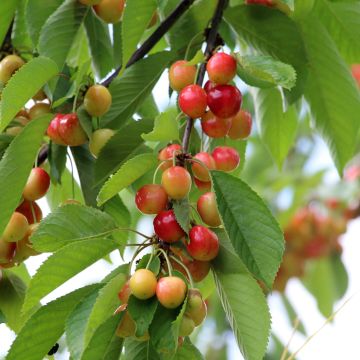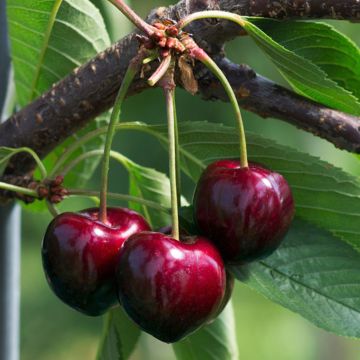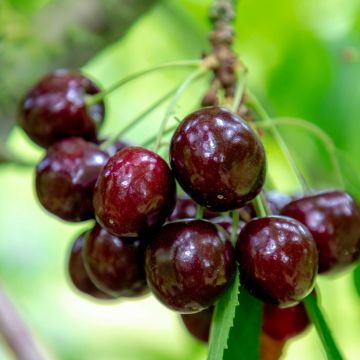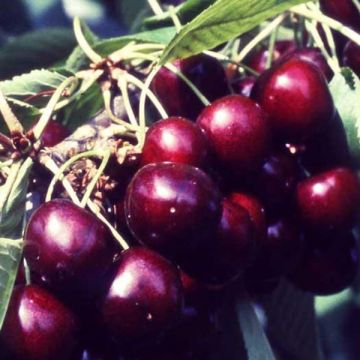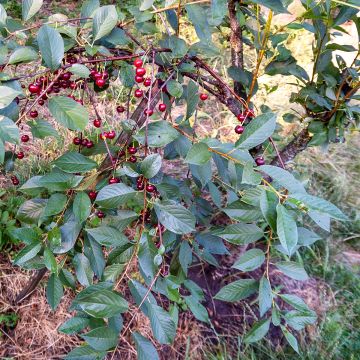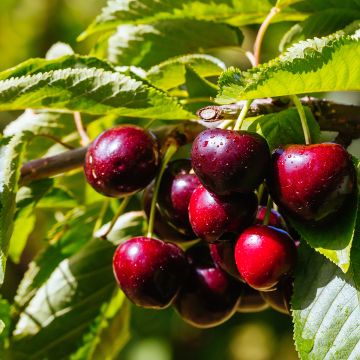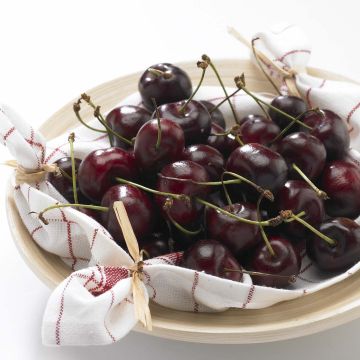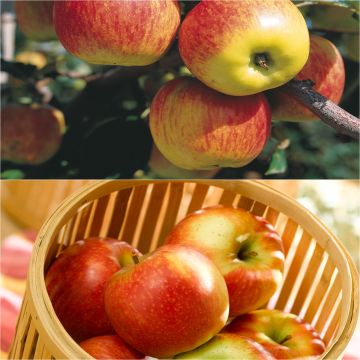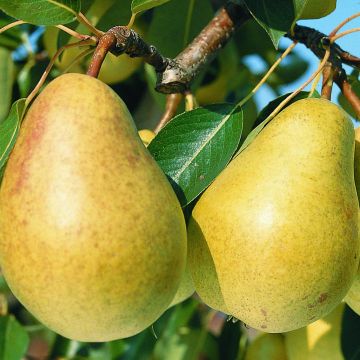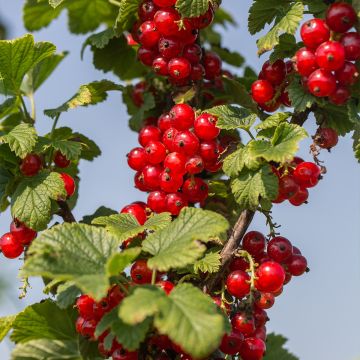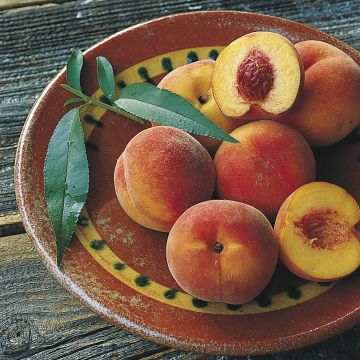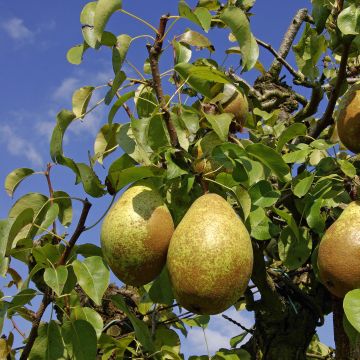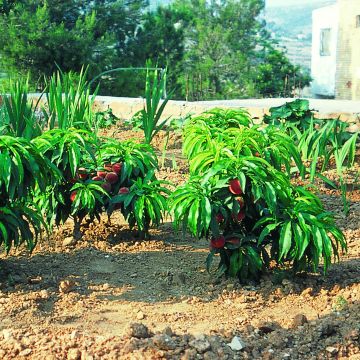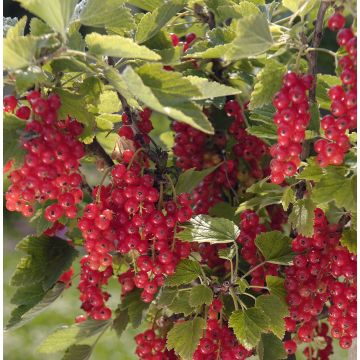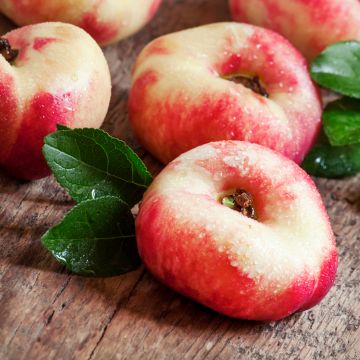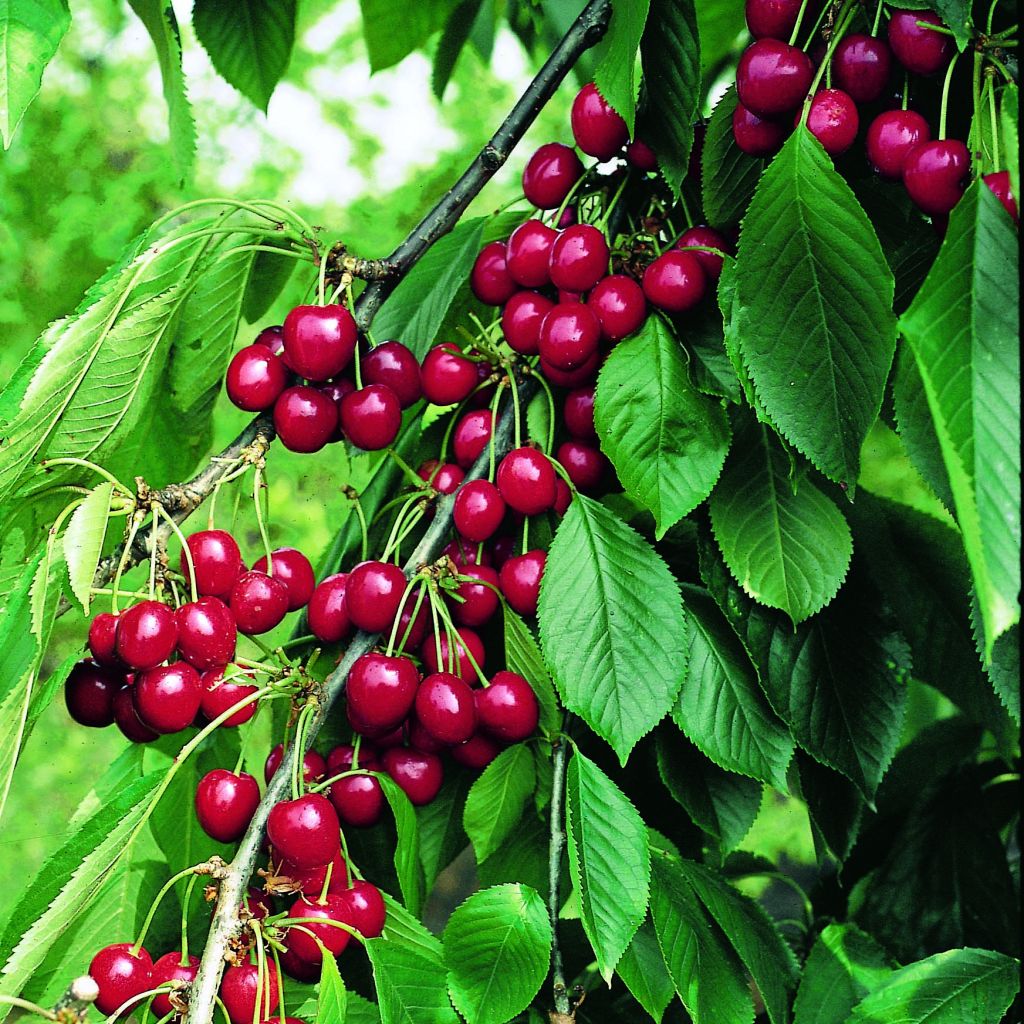

Prunus cerasus Belle Magnifique - Tart Cherry Tree
Prunus cerasus Belle Magnifique - Tart Cherry Tree
Prunus cerasus Belle Magnifique
Sour Cherry, Tart Cherry, Dwarf Cherry, Morello Cherry
cerisier Belle Magnifique en motte, bien reçu dans les délais annoncés. Beau sujet mais à la plantation j'ai été surpris de découvrir des racines extrêmement courtes (environ 4 à 5 cm tout autour) On verra ce qu'il en est au printemps
Rene, 08/12/2022
Special offer!
Receive a €20 voucher for any order over €90 (excluding delivery costs, credit notes, and plastic-free options)!
1- Add your favorite plants to your cart.
2- Once you have reached €90, confirm your order (you can even choose the delivery date!).
3- As soon as your order is shipped, you will receive an email containing your voucher code, valid for 3 months (90 days).
Your voucher is unique and can only be used once, for any order with a minimum value of €20, excluding delivery costs.
Can be combined with other current offers, non-divisible and non-refundable.
Home or relay delivery (depending on size and destination)
Schedule delivery date,
and select date in basket
This plant carries a 6 months recovery warranty
More information
We guarantee the quality of our plants for a full growing cycle, and will replace at our expense any plant that fails to recover under normal climatic and planting conditions.
Description
The 'Belle Magnifique' Cherry Tree is a self-fertile variety of sour cherry with a late harvest. An excellent pollinator for Bigarreau varieties, this cherry tree also produces beautiful cherries with red skin and light pink flesh. A good table fruit, this cherry, or sour cherry, is also a great candidate for making delicious clafoutis.
Sour cherries have a sweet flavour like Bigarreau cherries, but with softer flesh. The cherries of 'Belle Magnifique' are round with bright red and shiny skin. The tender and juicy flesh is tangy and sweet. The flowering occurs between March and April, and the harvest begins in mid-July and lasts for about two weeks. The tree is perfectly hardy and remains of moderate size with low branches, making harvesting easier. It can reach a height of 8 metres (26 feet) with a spread of approximately 6 meters (20 feet).
This cherry tree can withstand the harshest winters but may suffer in the hottest summers. It is a self-fertile variety, convenient for small gardens, but it will bear fruit better if planted near a Bigarreau variety such as 'Burlat', 'Reverchon', 'Marmotte', or 'Napoléon'. Pollinating bees don't care about fences, so a tree planted in a neighbouring garden will do just fine.
Having a cherry tree in your garden is truly a source of happiness in every season. In spring, the buzzing blossoms are a delight for the eyes and ears. Then comes the pleasure of picking and enjoying the delicious fruits on the spot or in the kitchen - everyone loves them, young and old. In autumn, sour cherry trees display beautiful vibrant colours.
For transportation reasons, our tallest scions may be pruned before shipping. They are suitable for all common training sizes: cordons, espaliers, goblets, half-standards, and low standards, except for high standards. If you would like more information or advice on training your fruit trees, please do not hesitate to contact us.
This fruit tree is delivered in a 'ready-to-plant' rootball. During planting, the rootball should be planted as is. The biodegradable tontine surrounding the rootball, which preserves the rootlets, will decompose naturally during the plant's growth. By doing so, you ensure better establishment.
Report an error about the product description
Prunus cerasus Belle Magnifique - Tart Cherry Tree in pictures
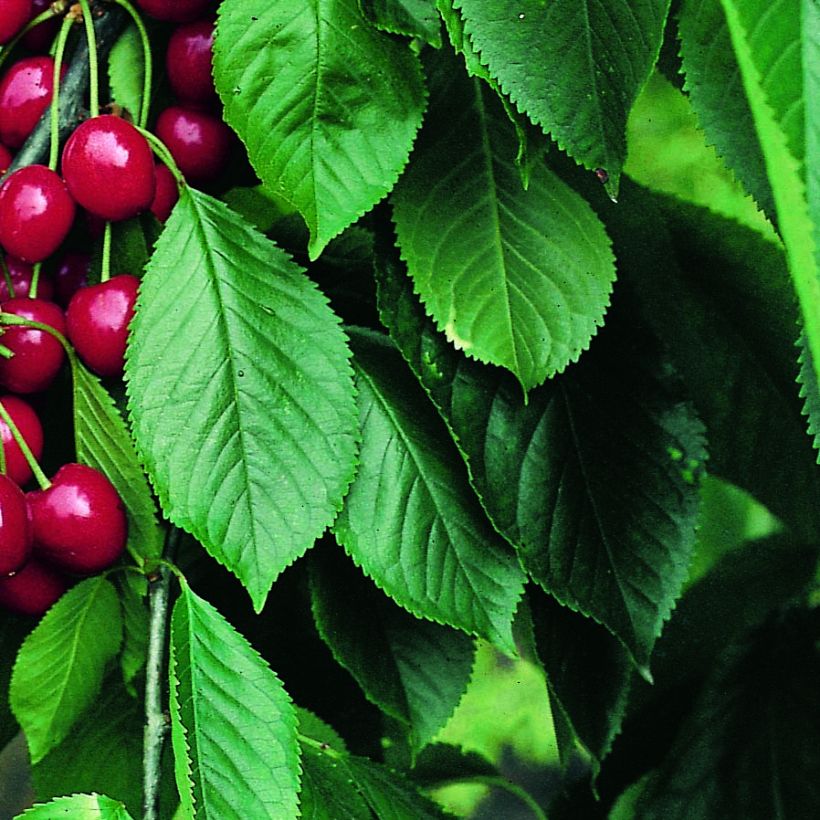

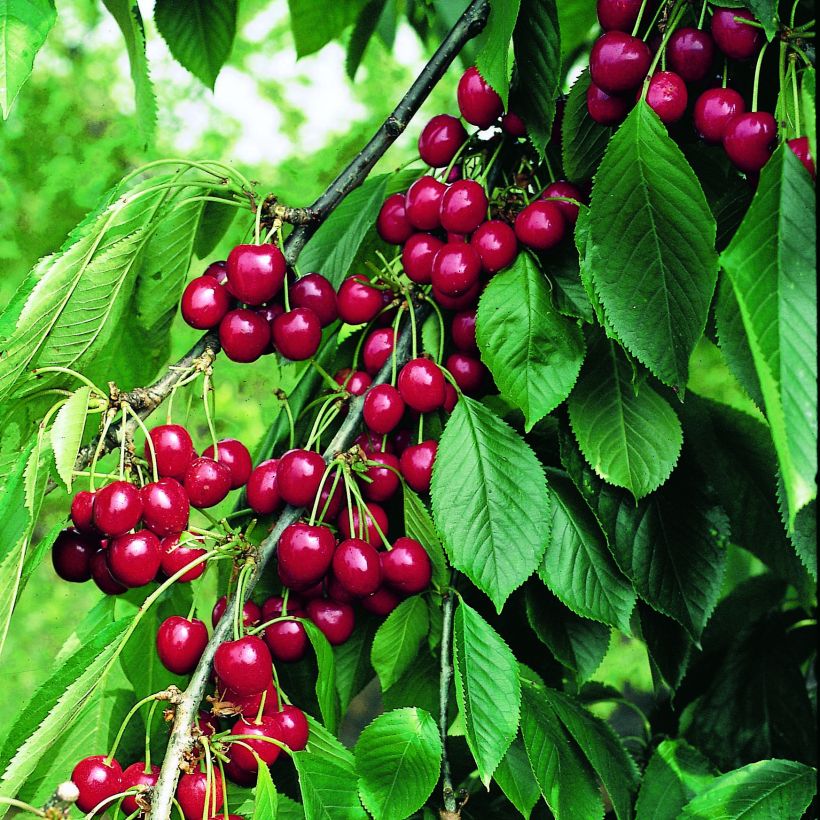

Plant habit
Fruit
Flowering
Foliage
Botanical data
Prunus
cerasus
Belle Magnifique
Rosaceae
Sour Cherry, Tart Cherry, Dwarf Cherry, Morello Cherry
Cultivar or hybrid
Maxma 14 (Ready-to-plant root ball - Goblet)
Other Cherry trees
View all →Planting and care
Easy to grow, this Cherry tree grows in any type of soil, acidic or chalky. It prefers moist, light soils and is sensitive to heavy, clay soils. Choose a sunny exposure. To limit the risk of late frost on the flowers, it is recommended to plant the Cherry tree in a sheltered location, facing west and protected from cold winds in regions that experience spring frosts. Planting is preferably done in autumn. If you plant multiple trees, space them 4 to 5 m (13 to 16ft) apart for goblet-shaped plants.
Loosen the soil deeply, remove rocks and unwanted weeds. Add some sand to improve drainage. Dig a hole 4 to 5 times the volume of the root ball. Make sure to separate the bottom soil from the topsoil. Mix bonemeal or well-rotted compost or potting compost with the soil and pour this mixture into the planting hole. Install a stake. Place the root ball, cover with the topsoil and firm it down. Water generously (about 10L). Attach the stake to the plant, crossing the tie in a figure-8 shape, without touching the trunk.
During cultivation, watering is not necessary except in case of extreme heat. Mulch at the base to retain moisture in summer. Protect your harvest by installing, as desired, a bird net, aluminum foil or old CDs. In case of aphid attack, spray with soapy water.
Planting period
Intended location
Care
-
, onOrder confirmed
Reply from on Promesse de fleurs
Similar products
Haven't found what you were looking for?
Hardiness is the lowest winter temperature a plant can endure without suffering serious damage or even dying. However, hardiness is affected by location (a sheltered area, such as a patio), protection (winter cover) and soil type (hardiness is improved by well-drained soil).

Photo Sharing Terms & Conditions
In order to encourage gardeners to interact and share their experiences, Promesse de fleurs offers various media enabling content to be uploaded onto its Site - in particular via the ‘Photo sharing’ module.
The User agrees to refrain from:
- Posting any content that is illegal, prejudicial, insulting, racist, inciteful to hatred, revisionist, contrary to public decency, that infringes on privacy or on the privacy rights of third parties, in particular the publicity rights of persons and goods, intellectual property rights, or the right to privacy.
- Submitting content on behalf of a third party;
- Impersonate the identity of a third party and/or publish any personal information about a third party;
In general, the User undertakes to refrain from any unethical behaviour.
All Content (in particular text, comments, files, images, photos, videos, creative works, etc.), which may be subject to property or intellectual property rights, image or other private rights, shall remain the property of the User, subject to the limited rights granted by the terms of the licence granted by Promesse de fleurs as stated below. Users are at liberty to publish or not to publish such Content on the Site, notably via the ‘Photo Sharing’ facility, and accept that this Content shall be made public and freely accessible, notably on the Internet.
Users further acknowledge, undertake to have ,and guarantee that they hold all necessary rights and permissions to publish such material on the Site, in particular with regard to the legislation in force pertaining to any privacy, property, intellectual property, image, or contractual rights, or rights of any other nature. By publishing such Content on the Site, Users acknowledge accepting full liability as publishers of the Content within the meaning of the law, and grant Promesse de fleurs, free of charge, an inclusive, worldwide licence for the said Content for the entire duration of its publication, including all reproduction, representation, up/downloading, displaying, performing, transmission, and storage rights.
Users also grant permission for their name to be linked to the Content and accept that this link may not always be made available.
By engaging in posting material, Users consent to their Content becoming automatically accessible on the Internet, in particular on other sites and/or blogs and/or web pages of the Promesse de fleurs site, including in particular social pages and the Promesse de fleurs catalogue.
Users may secure the removal of entrusted content free of charge by issuing a simple request via our contact form.
The flowering period indicated on our website applies to countries and regions located in USDA zone 8 (France, the United Kingdom, Ireland, the Netherlands, etc.)
It will vary according to where you live:
- In zones 9 to 10 (Italy, Spain, Greece, etc.), flowering will occur about 2 to 4 weeks earlier.
- In zones 6 to 7 (Germany, Poland, Slovenia, and lower mountainous regions), flowering will be delayed by 2 to 3 weeks.
- In zone 5 (Central Europe, Scandinavia), blooming will be delayed by 3 to 5 weeks.
In temperate climates, pruning of spring-flowering shrubs (forsythia, spireas, etc.) should be done just after flowering.
Pruning of summer-flowering shrubs (Indian Lilac, Perovskia, etc.) can be done in winter or spring.
In cold regions as well as with frost-sensitive plants, avoid pruning too early when severe frosts may still occur.
The planting period indicated on our website applies to countries and regions located in USDA zone 8 (France, United Kingdom, Ireland, Netherlands).
It will vary according to where you live:
- In Mediterranean zones (Marseille, Madrid, Milan, etc.), autumn and winter are the best planting periods.
- In continental zones (Strasbourg, Munich, Vienna, etc.), delay planting by 2 to 3 weeks in spring and bring it forward by 2 to 4 weeks in autumn.
- In mountainous regions (the Alps, Pyrenees, Carpathians, etc.), it is best to plant in late spring (May-June) or late summer (August-September).
The harvesting period indicated on our website applies to countries and regions in USDA zone 8 (France, England, Ireland, the Netherlands).
In colder areas (Scandinavia, Poland, Austria...) fruit and vegetable harvests are likely to be delayed by 3-4 weeks.
In warmer areas (Italy, Spain, Greece, etc.), harvesting will probably take place earlier, depending on weather conditions.
The sowing periods indicated on our website apply to countries and regions within USDA Zone 8 (France, UK, Ireland, Netherlands).
In colder areas (Scandinavia, Poland, Austria...), delay any outdoor sowing by 3-4 weeks, or sow under glass.
In warmer climes (Italy, Spain, Greece, etc.), bring outdoor sowing forward by a few weeks.






























